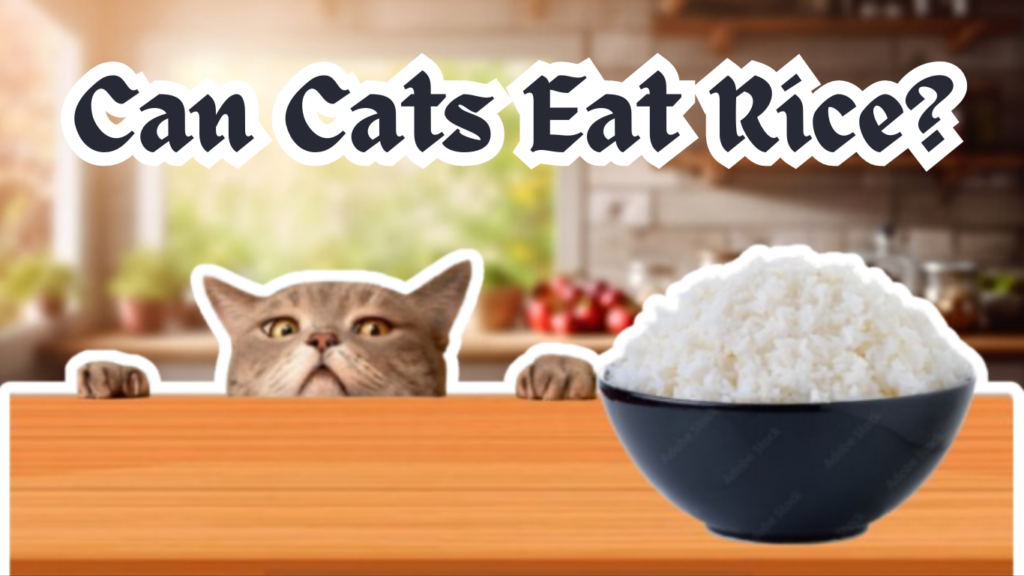As pet owners, we always want to ensure our cats are eating the healthiest foods possible. Cats are curious creatures, and sometimes they may show interest in human foods, like rice. But is rice safe for cats? Should you be offering them a spoonful the next time you’re cooking up a stir-fry? In this blog post, we’ll explore whether cats can eat rice, the potential benefits, risks, and how it fits into their diet.
Benefits of Rice for Cats
While rice isn’t necessary for a cat’s diet, there are a few circumstances where it might be helpful:
1. Soothes Digestive Issues: In small amounts, rice can help with minor digestive issues, like diarrhea. Veterinarians sometimes recommend mixing rice with a small portion of plain chicken for cats with an upset stomach. The fiber in rice can help firm up stools and calm the digestive tract.
2. Calorie Source: If your cat needs a little extra energy or is recovering from an illness, rice can provide a quick source of carbohydrates. However, because rice lacks protein and fat, it shouldn’t be used as a primary energy source.
Risks of Feeding Rice to Cats
Despite being safe in small amounts, there are some things to keep in mind:
- Lacks Nutritional Value: Rice doesn’t offer much nutritional benefit for cats. Since cats require nutrients primarily found in meat, relying on rice or other grains can lead to malnutrition if it becomes a significant part of their diet.
- May Cause Digestive Upset in Large Quantities: Feeding too much rice can lead to bloating, gas, or constipation in cats. Their digestive systems are not designed to handle large amounts of grains or carbohydrates. Always offer rice in small portions if you choose to give it to your cat.
- Beware of Seasonings: Never feed your cat rice that contains seasonings, oils, garlic, onions, or other additives. These can be harmful or even toxic to cats. If you’re offering rice to your pet, it should always be plain, cooked, and unseasoned.
How to Safely Feed Rice to Cats
If you decide to give your cat rice, here’s how to do it safely:
- Cook It Thoroughly: Always serve plain, fully cooked rice. Raw or undercooked rice can cause digestive issues.
- Limit Portions: A teaspoon or two is more than enough. Rice should only be an occasional treat, not a regular meal.
- Pair with Protein: If your cat has an upset stomach, mix a small amount of rice with a bland protein like boiled chicken. This will give your cat some nutrition without overloading them with unnecessary carbs.
- Watch for Reactions: After giving your cat rice, monitor them for any signs of digestive upset, like vomiting, diarrhea, or constipation. If you notice any issues, stop feeding rice and consult your veterinarian.
What Should Cats Eat Instead?
Cats have specific dietary needs that are best met through a balanced, meat-based diet. A high-quality commercial cat food provides all the essential nutrients your cat requires, including:
- Taurine: An amino acid found in animal tissue, crucial for heart and eye health.
- Protein: Helps maintain lean muscle mass and supports overall health.
- Fats: Provide energy and help absorb fat-soluble vitamins.
If you want to add variety to your cat’s diet, stick to safe and healthy cat-friendly foods like small pieces of cooked chicken, fish, or turkey. Always ensure that any treats or supplements are specifically designed for feline nutrition.
Conclusion: Can Cats Eat Rice?
In conclusion, while cats can eat rice in small amounts, it should only be offered as an occasional treat or remedy for digestive issues. Rice lacks the essential nutrients cats need to thrive, so it should never replace their regular diet. If your cat is showing interest in your food, it’s best to stick with treats that are specifically designed for their dietary needs.
Always consult your veterinarian before introducing new foods to your cat’s diet, especially if they have specific health concerns. When in doubt, stick to a high-quality, meat-based diet to keep your cat happy and healthy.
